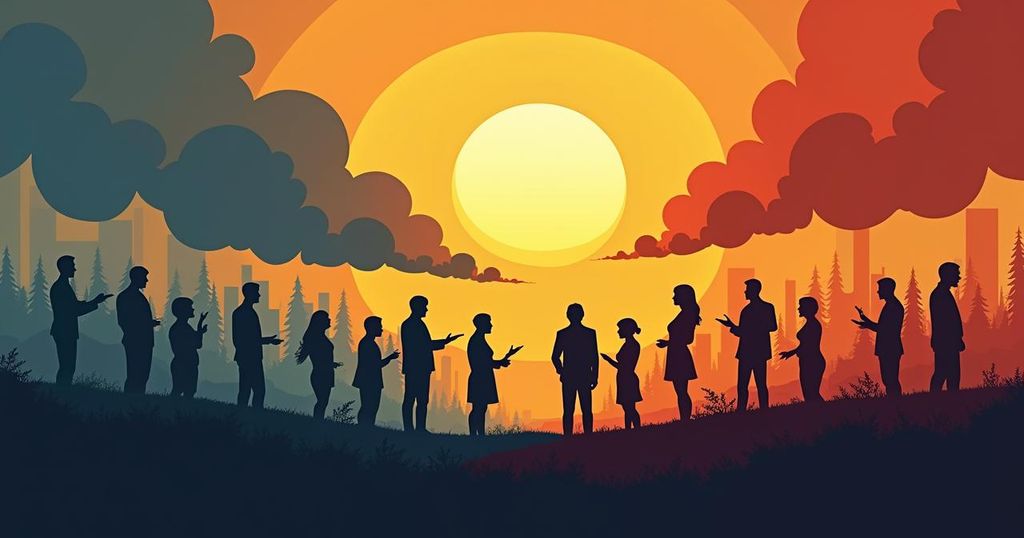JD Vance, during a recent debate, dismissed climate change as ‘weird science,’ exhibiting skepticism towards the assertion that human activities drive global warming. This viewpoint aligns with similar sentiments expressed by his running mate, Donald Trump, who termed climate change a significant scam. Despite acknowledging public concern over extreme weather, Vance proposed boosting American manufacturing as a solution, which contradicts established environmental realities. His shift in perspective over time reflects broader political trends in climate discourse.
During a recent vice presidential debate in New York City, JD Vance referred to climate change as “weird science,” expressing skepticism regarding the scientific consensus that human activities exacerbate global warming through carbon emissions. Vance, who appeared hesitant to firmly state whether he believes climate change is a genuine concern, commented on the Democratic narrative concerning carbon outputs, saying, “This idea that carbon emissions drive all the climate change – let’s just say that’s true, just for the sake of argument so we’re not arguing about weird science.” This discourse on climate change emerges in the context of severe weather events, notably Hurricane Helene, which resulted in extensive destruction and loss of life in southeastern states last week. In the same week, his running mate, Donald Trump, caused unrest by labeling climate change “one of the greatest scams of all time.” During the debate, Vance acknowledged public anxiety over unusual weather patterns while reiterating support for environmental quality, stating, “Look, a lot of people are very justifiably worried about all these crazy weather patterns.” Despite emphasizing a commitment to clean air and water, Vance suggested that bolstering American manufacturing could address carbon emissions. He presented the argument that enhancing domestic energy production would be beneficial since he claimed, “we’re the cleanest economy in the entire world,” a statement contradicted by data indicating that the U.S. remains one of the leading greenhouse gas emitters globally. Historically, Vance’s position on climate change has fluctuated significantly. In 2020, he acknowledged the existence of climate issues in a speech at Ohio State University but later adopted a more skeptical stance in 2022, aligning closer to the views of his running mate. This evolution is particularly noteworthy, as scientific authorities have persistently linked climate change to extreme weather incidents. After Hurricane Helene, FEMA Administrator Deanne Criswell highlighted the direct connection between climate emergencies and the flooding, illustrating the ongoing relevance of climate discussions. Notably, despite 87 percent of Americans reporting experiences with extreme weather events over the past five years, climate change remains a lower priority than other issues such as inflation and healthcare in the current electoral landscape.
The ongoing political discourse surrounding climate change has produced stark divisions, particularly among political candidates. JD Vance’s recent comments during a debate are part of a broader narrative wherein some Republican leaders have expressed skepticism towards the scientific community’s consensus on climate change. This skepticism often emerges amidst increasing extreme weather events, which many scientists and former officials attribute to the climate crisis. Past statements by Vance have shown a trajectory of belief in climate issues that has since been tempered by alignment with the prevailing skepticism within certain political circles, particularly adjacent to Donald Trump’s rhetoric. Understanding this background is essential for interpreting contemporary political stances on environmental matters.
In summary, JD Vance’s dismissal of climate change as ‘weird science’ reflects a significant deviation from previously acknowledged realities about the climate crisis. This shift parallels the contentious political climate surrounding environmental issues, notably illustrated by the tragic aftermath of Hurricane Helene. Vance’s stance, amidst a backdrop of extreme weather phenomena, highlights ongoing debates about accountability, scientific consensus, and the political priorities of voters in relation to the climate emergency.
Original Source: www.independent.co.uk






